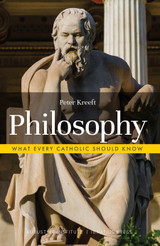Product Overview
Series Summary
The What Every Catholic Should Know series is intended for the average faithful Catholic who wants to know more about Catholic faith and culture. The authors in this series take a panoramic approach to the topic of each book aimed at a non-specialist but enthusiastic readership. Already published titles in this series include: literature, salvation, mercy, being Catholic, God, and philosophy.
Book Summary
“The need for this book is perennial, but it is especially acute today, when both faith and reason are on life support in our culture, which is increasingly hostile to both, or at least to the classical or traditional forms of both….In this culture it is essential that Catholics and other Christians know the intellectual weapons and strategies of the enemies of religious faith and the defensive and offensive intellectual weapons that defeat them. Philosophical arguments are needed. They are weapons in the intellectual dimension of spiritual warfare, a warfare which is just as real and just as much a matter of life or death as physical warfare.”
Just what is philosophy? Is there objective truth? Is self-knowledge possible? What is being? What is man’s relation to nature? Is it possible for human reason to know God? If there is a God, why is there evil? What is happiness and how can we achieve it? If you’ve ever wondered about the answers to any of these questions, this is the book for you! These and dozens of other crucial questions are asked and answered in this easy-to-read book by one of the best-known philosophers alive today. Every Catholic should own one book on philosophy. This is it.
Editorial Reviews
"Peter Kreeft, our very own C. S. Lewis, is a keen diagnostician of our moral and spiritual disorders."
—Robert Reilly, Author, America on Trial: A Defense of the Founding
"Many writers have the gift of irony, or humor, or logic, or common sense. Very few combine all these gifts in one talent and put it at the service of truth. Peter Kreeft is simply the best, the most engaging, Christian apologist at work today."
—Francis X. Maier, Senior Fellow, Ethics and Public Policy Center








